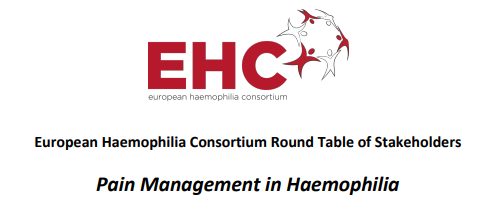By Paul McLaughlin, EAHAD Physiotherapists Committee member, EAHAD Regional Coordinator (UK)
Pain is a symptom of many disease processes and sometimes can be present even without a disease. In haemophilia, it is a cardinal feature of acute joint bleeding and, for many, it is a daily feature of a life lived with haemophilic arthropathy. Studies have suggested that between 35-50% of haemophilia patients have ongoing pain. This is pain that interferes with family life, work, study, and even the day-to-day tasks of self-care and mobility.
On 11 June, in Brussels, the European Haemophilia Consortium (EHC) hosted a round table on the very pertinent topic of pain management in haemophilia.
The round table brought together a multidisciplinary panel of speakers. The speakers included patients, physiotherapy and rehabilitation professionals, a psychologist, a health economist and an orthopaedic surgeon. The talks focussed on the different approaches of pain in people with haemophilia: The topics discussed were: the basics of availability of effective clotting factor replacement; the current thinking of neurophysiology of pain science; the best way to assess pain at an individual level; the cost of pain (to the person and society); the psychological interventions for pain; the pharmacology of pain medications; the role of the orthopaedic surgeon. The discussions were rich and more than highlighted the importance of the multidisciplinary approach.
From the multitude of audience questions, it is clear that, as the decade reaches its end, pain remains a significant personal and clinical issue. The need for better access to physiotherapy and psychological services, in order to better establish non-pharmacological interventions for pain management, was brought to the fore. It is evident that knowledge of pain science is lacking in haemophilia care and needs to be integrated in day-to-day care by all professionals working with people with haemophilia.
Pain associated with haemophilic arthropathy is a major issue. We, as physiotherapists, are key to any pain management intervention. Our skills as expert communicators and our knowledge of physical activity and rehabilitation puts us at the perfect spot to help lead conversations about how to further enhance care for those in need.
Return to the Newsletter

